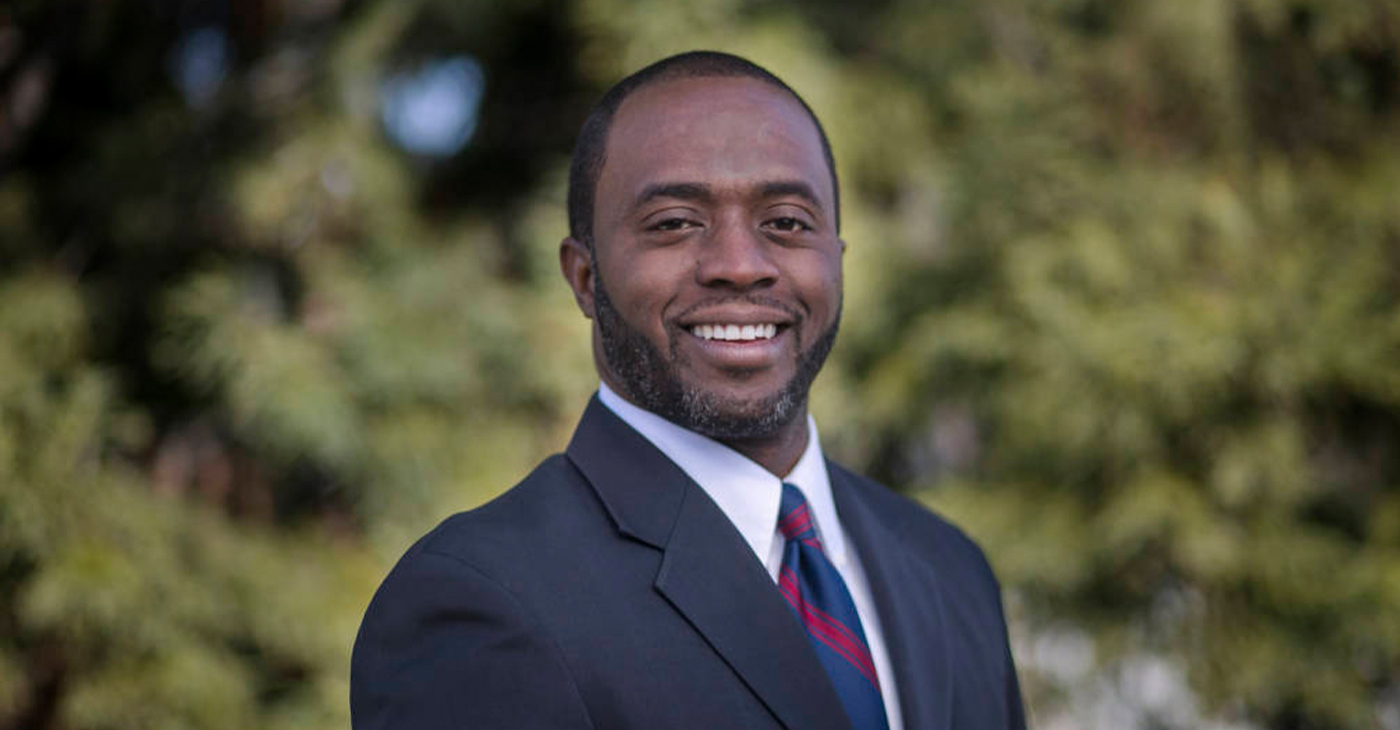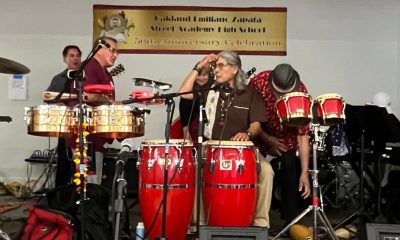California Black Media
The Lookout: Six Bills Call for More Responsible Policing, Safer Streets
The California Legislature is currently considering several bills related to gun safety, criminal justice, and police accountability. Several of these bills have already been approved by the Assembly Safety Committee and are now under review by other legislative committees. If passed, they could affect policing in your community, juvenile arrests and rights, tickets for traffic violations, and state policy around gun ownership.

Aldon Thomas Stiles | California Black Media
Watching your tax dollars, elected officials and legislation that affects you.
The California Legislature is currently considering several bills related to gun safety, criminal justice, and police accountability.
Several of these bills have already been approved by the Assembly Safety Committee and are now under review by other legislative committees. If passed, they could affect policing in your community, juvenile arrests and rights, tickets for traffic violations, and state policy around gun ownership.
Public Safety Committee Chair Assemblymember Reggie Jones-Sawyer (D-Los Angeles) authored Assembly Bill (AB) 574. Under the proposed bill, gun owners would need to confirm possession of all their registered weapons when purchasing a new gun.
Jones-Sawyer maintains “many firearms are not reported missing or stolen until they have been used in a crime.”
Daniel Reid, western regional director of the National Rifle Association (NRA), has voiced his organization’s opposition to AB 574.
“We feel like the bill lacks clarity,” said Reid. “If the firearm can’t go without a ‘yes’ answer you have a Fifth Amendment issue. It violates your right against self-incrimination. People can’t be compelled to incriminate themselves if they are in violation of this law.”
The Assembly Appropriations Committee is currently reviewing AB 574. A hearing date has not yet been set.
Jones-Sawyer has also introduced AB 1090. It would allow a board of supervisors to remove an elected sheriff with a four-fifths vote.
The bill states that sheriffs facing removal would be notified of the reason and would have an opportunity to defend themselves.
Cory Salzillo, Legislative Director of the California State Sheriff’s Association, opposes AB 1090, claiming it undermines the electoral process.
“This is not good government,” said Salzillo. “This is disenfranchising voters.”
Explaining why the bill is needed, Jones-Sawyer said, “the bill provides counties with a meaningful tool to remove a sheriff for serious violations of the public trust.”
AB 1090 is currently under consideration in the Assembly Local Government Committee.
Assemblymember Rebecca Bauer-Kahan (D-Orinda) authored AB 1643. This bill would prohibit minors — ages 12 to 17 years old — from participating in a program of supervision unless the minor has committed an offense in which the restitution owed exceeds $5,000.
Proponents of AB 1643 clarified that this bill would allow minors to be eligible for diversion programs, and judges and probation departments will still have discretion.
This bill is part of California’s broader effort to reform its criminal justice system by prioritizing rehabilitation over punishment.
Supporters of this bill say one of its goals is to avoid the trauma and stigma associated with youth who go through the criminal justice system.
Last week, the Assembly Appropriations Committee postponed a hearing on the bill.
AB 642, introduced by Assemblymember Phil Ting (D-San Francisco), would limit the use of facial recognition technology (FRT) by law enforcement in felony arrests and prevent individuals from being stopped based on FRT information. The bill would also require law enforcement agencies to have written FRT policies and maintain records of its use, which would be reported to the California State Auditor.
AB 642 is not Ting’s first attempt to restrict FRT. The lawmaker’s AB 1215 in 2019 temporarily banned the use of FRT in body cameras for three years.
The American Civil Liberties Union (ACLU) expressed their opposition to AB 642 because the civil rights advocacy organization believes it does not go far enough.
“If it is intended to stop the civil rights disaster that is admittedly face recognition surveillance, it unfortunately backfires,” said ACLU California Action Director of Government Affairs Carmen-Nicole Cox. “The recently authored amendments do not adequately protect against freedom from unreasonable government surveillance, wrongful seizure, or dissuade its misuse.”
Another bill Ting introduced, AB 645, authorizes a five-year pilot program that would temporarily legalize speed enforcement cameras in six California cities: Los Angeles, San Jose, Oakland, Glendale, Long Beach and San Francisco.
“My city of San Francisco is committed to reducing traffic fatalities to zero,” Ting said in a press release. “More than 70% of our city’s fatalities occur on just 12% of our streets.”
The pedestrian advocacy group Walk San Francisco has been a vocal supporter of AB 645 while other organizations like the American Civil Liberties Union have strongly opposed it, citing its encroachment on privacy rights.
The Assembly Committee on Privacy and Consumer Protection voted to approve AB 645 and has referred it to the Appropriations Committee for consideration.
The Assembly Public Safety Committee voted to place AB 1260, authored by Assemblymember Joe Patterson (R-Rocklin), “on call.” The “on call” designation means that the legislation is subject to change, but it has not been rejected.
AB 1260 would require parole departments to determine an inmate’s minimum eligible parole date based on their sentence and any credits earned or expected to be earned during incarceration. Credits refer to points awarded for good conduct or behavior. The bill would also require parole departments to notify the district attorney when an inmate is being released based on credits earned or revoked and the county to which the inmate is returning.
Patterson stated his bill would provide more standardization and oversight for sentence lengths based on the credit system.
“How can we be sure that an inmate is serving the proper length of time — and this includes possibly serving too much time — without any third-party verification whatsoever?” questioned Patterson.
A representative of the advocacy group Initiate Justice says that AB 1260 is “not necessary,” because there already exists an online victim notification system.
But proponents of the bill argue that the current system places the burden on relatives and next of kin to keep checking online to see if the release date has changed.
California Black Media
Cinco De Mayo: Five Interesting Facts You Should Know About the Popular Mexican American Holiday
To explore the historical significance of Cinco De Mayo, we step back to the origins of the commemoration, share how some Mexican American Californians regard it and trace how it has morphed into the celebrations we see today.

By Edward Henderson, California Black Media
To explore the historical significance of Cinco De Mayo, we step back to the origins of the commemoration, share how some Mexican American Californians regard it and trace how it has morphed into the celebrations we see today.
Celebrations in the United States began in 1862 in Columbia, California, a small town located in the foothills of the Sierra Nevada in Tolumne County, according to that town’s website.
Today, millions of Americans celebrate Cinco De Mayo annually with 120 official celebrations organized across the United States.
This day has become a cultural point of pride for Mexican Americans and other Latino communities in the United States. It serves as a time to affirm and celebrate their cultures with other Americans of all backgrounds as they highlight their contributions to American history and society.
Joseph Soltero, a Mexican American living in Escondido, shared his perspective on Cinco de Mayo with California Black Media. He learned about Cinco De Mayo from his grandfather and talked about the extent to which his family and San Diego County community celebrate the holiday.
“We knew September 16 was really Mexican Independence Day, but kids in my school would always mistake Cinco De Mayo as our Independence Day. [Cinco De Mayo] is not really even a Mexican holiday,” said Soltero. “It’s something people do to have an excuse to buy drinks, have fun and spend a little money at taco shops.”
Like Soltero, many Mexican Americans (and other Latino Californians) do not take the support and solidarity they receive from people of other races on Cinco De Mayo for granted. They also appreciate when people take the time to learn about the cultural significance of the day and avoid some of the cultural tropes that can easily whisper undertones of racism.
To help raise your awareness about the origins and cultural significance of the day, here are 5 little known facts about Cinco De Mayo:
- Cinco De Mayo is not Mexican Independence Day. It is the anniversary of the Battle of Puebla. This military victory on May 5, 1862, over the French forces of Napoleon III was hailed as a symbol for Mexican resistance to foreign influence.
- The holiday was not given much historical significance outside of Puebla, and it has not been celebrated on a large scale in Mexico. However, during the Civil War, Mexican Americans in California, Oregon and Nevada who supported the Union drew inspiration from the victory over the French-backed Confederate forces.
- The Chicano civil rights movement in the 1940s gave a new energy to celebration of the holiday in the United Sates as a symbol of national pride.
- In the 1980s and 1990s, beer companies’ marketing strategies targeted Mexican Americans by encouraging them to celebrate their heritage – and Cinco De Mayo –with Coronas, Bud Light, and Dos Equis. This created the perceived connection between Cinco De Mayo, alcohol, and merrymaking.
- Los Angeles hosts the largest Cinco De Mayo celebration in the country.
As we join Mexican American Californians to celebrate Cinco De Mayo next week, let’s deepen our cultural understanding.
Let’s use this occasion to commit to learning more about our neighbors, colleagues and friends of other races and ethnicities.
This resource is supported in whole or in part by funding provided by the State of California, administered by the California State Library in partnership with the California Department of Social Services and the California Commission on Asian and Pacific Islander American Affairs as part of the Stop the Hate program. To report a hate incident or hate crime and get support, go to CA vs Hate.
Antonio Ray Harvey
Working Group: More Entry-Level Homes Could Help Solve Housing Crisis
The Community Housing Working Group hosted a briefing on April 23 at Cafeteria 15L in Sacramento. Discussions focused on how the housing crisis in California affects Black and Brown communities and explored ways to provide low-income families and individuals with affordable housing.

By Antonio Ray Harvey, California Black Media
The Community Housing Working Group hosted a briefing on April 23 at Cafeteria 15L in Sacramento. Discussions focused on how the housing crisis in California affects Black and Brown communities and explored ways to provide low-income families and individuals with affordable housing.
Tia Boatman Patterson, CEO and President of the California Communities Reinvestment Corporation, said “entry-level housing” is not available as it was in the past, adding that affordable units were a major point of entry into homeownership for many families in the Black community.
“My mother bought her first house when I was in junior high. It was an 850-square foot, two-bedroom and one-bathroom house in 1978. That house cost $30,000,” Boatman-Patterson said.
“A woman working part-time at JCPenney was able to afford that house. We don’t build these types of housing now. We do not build entry-level homeownership,” she added.
The Community Housing Working Group is a collection of diverse community organizations from across California working together to address housing challenges in their communities. The organization believes that solving the affordable housing crisis will require creating enough smaller, lower-cost, multi-family homes located near jobs, transit, and good schools.
The briefing included a panel discussion titled, “Exclusionary Zoning: A Look Back and a Path Forward.” Boatman-Patterson participated in that session along with Henry “Hank” Levy, Treasurer-Tax Collector for Alameda County, and Noerena Limón, consultant, Unidos U.S., and Board Member of California Housing Finance Agency.
Boatman-Patterson, a former Associate Director for Housing, Treasury and Commerce in the Office of Management and Budget for the Biden Administration, started her presentation by highlighting how exclusionary single-family zoning is contributing to continued segregation of California communities.
She said that single-family zoning originated in the Bay Area city of Berkeley in 1916.
“By creating single-family zoning and having fenced-off communities, you were able to exclude the ‘others,’” Boatman-Patterson said. “It really was a method to exclude — what they called ‘economic segregation’ — but that was a guise for racial segregation. Single-family zoning, along with redlining, became a systemic approach to exclude based on affordability.”
Title VIII of the federal Civil Rights Act of 1968 — commonly known as the Fair Housing Act of 1968 – is the U.S. federal legislation that protects individuals and families from discrimination in the sale, rental, and financing of housing. It was passed to open the doors to affordable housing.
In 1968, 65.9% of White families were homeowners, a rate that was 25% higher than the 41.1% of Black families that owned their homes, according to National Low-Income Housing Coalition. Today, those figures have hardly changed in the Black community, although White homeownership has increased five percentage points to 71.1%.
Boatman Patterson said the rate has not changed in Black and Brown communities because financing for affordable entry-level homes is almost nonexistent. The homeownership disparities contribute to the disturbing racial wealth gap in the nation, according to the National Low-Income Housing Coalition’s October 2018 report.
“We really must align the financing with the actual building of units, which we haven’t necessarily done. Because of this misalignment, I think we continue to see problems,” Boatman-Patterson said.
California Black Media
State Ed Chief Tony Thurmond Pushes Bill to Train Educators
State Superintendent of Public Instruction (SSPI) Tony Thurmond is advocating for comprehensive training for teachers in reading and math, emphasizing the urgent need to improve student academic outcomes across California. On April 24, during testimony in the Senate Education Committee, Thurmond backed Senate Bill (SB)1115, which aims to provide evidence-backed educator training. The committee passed the bill with a 7-0 vote.

By California Black Media
State Superintendent of Public Instruction (SSPI) Tony Thurmond is advocating for comprehensive training for teachers in reading and math, emphasizing the urgent need to improve student academic outcomes across California.
On April 24, during testimony in the Senate Education Committee, Thurmond backed Senate Bill (SB)1115, which aims to provide evidence-backed educator training. The committee passed the bill with a 7-0 vote.
Thurmond pointed out to the committee that existing funding for educator training in literacy and math only covers about one-third of California’s educator workforce. SB 1115, Thurmond said, would fund the remaining two-thirds.
“This is an issue of moral clarity,” according to Thurmond. “In the fifth-largest economy in the world, and in an age when we have access to substantial brain science about how students learn, it should be unacceptable to train only some educators in the best strategies to teach essential skills.”
SB 1115 incorporates multiple research-backed methods, including phonics, and it aligns with the California ELA/ELD Framework, which encourages biliteracy and multilingualism.
Thurmond emphasized the moral imperative behind the push for enhanced training by noting that 70% of incarcerated adults struggle with reading or are illiterate.
“Every child should feel supported as they learn to read and every teacher should feel confident in their ability to support students’ foundational literacy,” Thurmond said. “SB 1115 is about ensuring that all children have the opportunity to read by third grade, and that all children have a shot at the life-changing outcomes that come from early literacy.”
The next step for SB 1115 is a hearing in the Senate Appropriations Committee on May 6.
-

 Community3 weeks ago
Community3 weeks agoFinancial Assistance Bill for Descendants of Enslaved Persons to Help Them Purchase, Own, or Maintain a Home
-

 Business3 weeks ago
Business3 weeks agoV.P. Kamala Harris: Americans With Criminal Records Will Soon Be Eligible for SBA Loans
-

 Activism3 weeks ago
Activism3 weeks agoOakland Post: Week of April 10 – 16, 2024
-

 Community3 weeks ago
Community3 weeks agoAG Bonta Says Oakland School Leaders Should Comply with State Laws to Avoid ‘Disparate Harm’ When Closing or Merging Schools
-

 Community2 weeks ago
Community2 weeks agoRichmond Nonprofit Helps Ex-Felons Get Back on Their Feet
-

 Activism1 week ago
Activism1 week agoOakland Post: Week of April 24 – 30, 2024
-

 Community2 weeks ago
Community2 weeks agoOakland WNBA Player to be Inducted Into Hall of Fame
-

 Community2 weeks ago
Community2 weeks agoRPAL to Rename Technology Center for Retired Police Captain Arthur Lee Johnson


















































